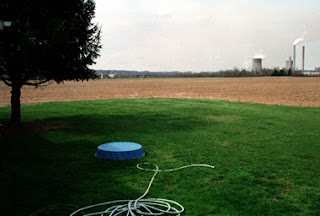Mason school consolidation site tests delivered with a disclaimer
July 28, 1998
Gazette Online
By Tara Tuckwiller
STAFF WRITER
POINT PLEASANT - No toxic waste appears to be contaminating the Mason County consolidated high school site, the head of a private testing firm told school board members Monday.
The results came with a disclaimer, though.
"We didn't sample for anything and everything," said Ron Potesta, head of Potesta and Associates of Charleston. "There may be something we missed."
The county paid Potesta $12,750 to test the school site's soil and groundwater after parents raised an alarm in April, when state environmental officials said the 65-acre field might be contaminated with toxic waste.
School board members - some of whom have since been voted out of office - had just voted to abandon a site the county already owned and buy the new site for $650,000 from a group of local businessmen.
They planned to close Wahama, Hannan and Point Pleasant high schools, and build a $15 million, 1,400-student county high school on the land north of Point Pleasant.
The land was part of a Superfund environmental cleanup site until four years ago, and toxic waste left over from a World War II explosives factory still contaminates the land and groundwater nearby.
The property was also used as a state agriculture test station for years, and parents became concerned that DDT and other pesticide residues may still contaminate the land.
Potesta didn't test for some of those chemicals, board member Shirley Gue noted. Gue has led other Mason County parents in fighting consolidation for three years.
"There's a known contaminant list from the Department of Defense. Arsenic, etc.," Gue said. "None of those things were tested?"
"That's correct," said Potesta engineer Dave Carpenter.
Carpenter said he just tested for what he expected to find, based on the memories of people who worked on the property and advice from some West Virginia University professors.
No written logs could be found for WVU's 30 years of agricultural tests, Potesta said. The man who ran the test station for 10 years said he may have some records of what chemicals he used, but he couldn't lay his hands on them just now.
Another man who had farmed the property said he had records of the chemicals he used, but he wouldn't let Carpenter see them.
"Most of them were referring to their memory, not exact logs," Potesta said.
"That's what concerns me," Gue said.
Potesta said he found no trace of the explosive trinitrotolulene (TNT), which contaminates the groundwater on the nearby Superfund site. He didn't find any residues from the pesticides and herbicides people remembered using on the field, either.
Potesta based his findings on 20 soil samples and a surface water sample from a drainage ditch that flows onto the property from the direction of the old explosives plant.
In wet weather, water from the ditch pools in the middle of the field and slowly seeps into the ground. In dry weather, a local farmer says the water in that ditch runs red, Carpenter said.
"That could be natural high iron in the soil. It could be biological activity," Carpenter said. "I never saw anything stained red in the ditch."
Local residents are still fighting the consolidation plan with a lawsuit, which is currently making its way through Mason County Circuit Court. Since anti-consolidation members took over the county school board in July, those residents have gained confidence.
"Won't make any difference," whispered consolidation foe Clifford Oliver, as Potesta and Carpenter prepared to make their presentation to the school board. "There ain't gonna be a school down there."
